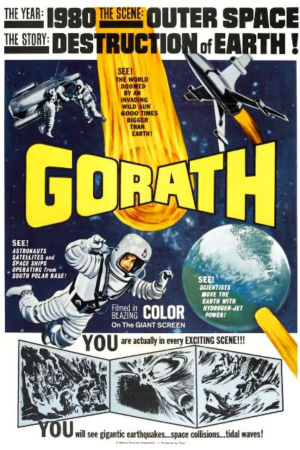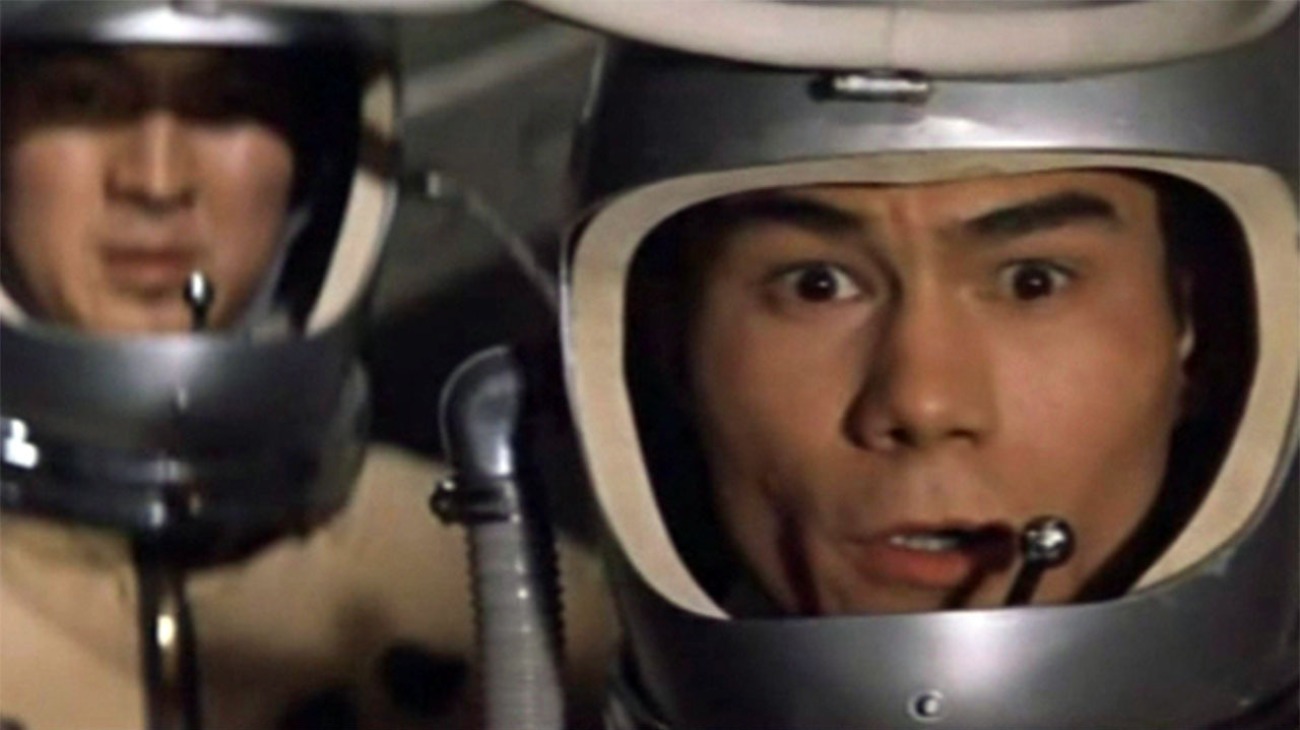
Review All Monsters! - The hammer of God
This week, our marathon of Toho's daikaiju eiga takes us to a pair of movies that are not, in the general scheme of things, considered to be monster movies in any real way at all. But like the fella once said, "come on, it has a giant damn monster walrus. Don't be such a hard-on".
(Before anybody brings it up in comments: yes, this does mean I should have reviewed The Mysterians. And maybe one day I shall, but you gotta put the brakes on somewhere).
The first of these, and the one with far less of a claim to belonging in this series whatsoever, is 1962's Gorath, which is frequently cited as being the concluding chapter of trilogy of films directed by Honda Ishirō for Toho, beginning with The Mysterians in 1957 and continuing with Battle in Outer Space. The best I can say in defense of that claim is that Gorath probably exists in the same fictional world as the other two films, but does not in any way reference the events within them. If you need things to come in threes, though, there's no reason not to think of the films as a trilogy. But Gorath doesn't need to be though of that way: it's merely one of many early-'60s tokusatsu films made by Toho. Tokusatsu being a word used to denote anything with a heavy emphasis on special effects; the daikaiju eiga are all tokusatsu, though many tokusatsu were not daikaiju eiga, but closer to what we'd call, in English, science fiction.
Gorath is, in particular, a gloss on the same basic notion of the American When Worlds Collide, the most famous of all movies about how an interstellar event is about to destroy Earth, and we need to deal with that. Gorath doesn't have such a downbeat ending as its American predecessor, but it's a great deal more grim and sober throughout, a good fit for the Honda who had made Godzilla, the story of a prehistoric monster that breathes fire, such a wrenching tale of devastation and society scrambling to hold itself together in the face of annihilation.
Set in the far-flung future of 1980, Gorath opens with the crew of the Japanese spaceship JX-1, commanded by Sonoda Raizo (Tazaki Jun) diverting from their mission to Saturn to investigate an anomaly: an incredibly dense object much smaller than Earth but with 6000 times our planet's mass. The ship is able to relay vital information about this "star", given the name Gorath, back to Japan, but is caught in the object's intense gravitational field and pulled to its destruction. The heads of Japan's astrophysics program, chiefly Dr. Tazawa (Ikebe Ryo) and Dr. Kono (Uehara Ken), quickly realise that Gorath represents a threat far greater than any one nation's security, and after a great deal of effort, they succeed in making the Japanese government present a case to the United Nations that the whole world must band together to save the human race and the planet we live on. A second vessel, the JX-2, is sent to keep near to Gorath and send reports of its status, while Tazawa hits on the only plan that can save Earth: mount jet engines at the South Pole, hundreds and hundreds of them, enough to provide the billions of megatons of force necessary to push the planet out of the way of Gorath before the star becomes too close to survive the debilitating effect of its gravitational pull.
That's the science part. In the meantime, Honda and screenwriter Kimura Takeshi explore the ramifications of life on a doomed planet through melodramatic human stories: Kanai Tatsuma (Kubo Akira), a crew member of the JX-2, tries to reconnect with an ex-lover, Takiko (Mizuno Kumi) whose fiancé died on the JX-1; at the same time, Tazawa begins to fall for Sonoda's daughter Tomoko (Shirakawa Yumi). The intent, I gather, is to show off how people try to keep on striving and living in the face of the end of the world, and it doesn't precisely fail at doing that, though it hurts the movie an awful lot that Tatsuma is something of a grandiose jerk and the bad case of amnesia he comes down with in the back half is absurd even by the standards of a movie that straps several hundred jet engines onto Antarctica to move the Earth out of its orbit.
Gorath has very little in the way of a reputation, and that's not entirely fair: the plot is absolutely a little overbaked, sure, but there simply aren't that many films that situate themselves among human characters who know damn well that they and everyone they know are probably about to die, and observe what that must feel like. Awareness of impending doom is the film's recurring theme, right from the moment that Cmdr. Sonoda realises that the JX-1 is going to be destroyed (it's worth mentioning that in that scene, Tazaki gives what is undoubtedly the best acting to be found anywhere in the movie). Honda's sure handling of this material, emphasising the gravity and seriousness of every moment, means that even the most florid moments are underplayed with a melancholic air, and cinematographer Koizumi Hajime underlights most of the action just slightly, to give the entire film a peculiarly overcast feeling, pulling out just enough light and color that we don't quite "notice" it, though it vividly informs how the movie feels as we're watching it. The score by Ishii Kan is jarring and urgent without having quite the same drama as Ifukube Akira's work in Honda's best-known works, but it still manages to indicate more gravity than excitement.
If all this sounds like Gorath is more dour than action-packed, that's sort of because it is. It's a pretty solid thriller, to be sure, though the third act begins to loose the thread quite badly and it all becomes a hair silly; but for the most part, Honda is playing things low-key and severe, and outside of Kubo, with an unwieldy part, the cast follows right along (Shimura Takashi has a small part, but for once in his career, he doesn't stand out - the whole movie is full of people with the same sense of utter seriousness that he did so well).
It's absolutely a minor film, but rewardingly true to its scenario. Which is what makes it weird when it lurches towards pulpy sci-fi action at the end; most notably, with the introduction of Maguma, a giant walrus that menaces the Antarctic base solely because the Toho suits refused to let Gorath out without any giant monster, even one that looks as unforgivably crappy as this one.
Not the company's brightest moment, to be sure, and even in a film with as many redressed off-the-shelf model kits as Gorath, that stands out as a pretty awful piece of effects work (for the most part, in fact, Tsuburaya Eiji was able to make the cheapness of the models work; there's a certain warm handicraft feel to the space scenes). Perhaps if Maguma was a truly great kaiju, I could forgive how badly it was spliced into the plot; but I doubt it very much, and the wallop that the film's momentum takes in this moment is something it never quite recovers from (to their credit, the American distributors had the good sense to almost completely excise the walrus).
But Maguma's not the only problem with the last third of the film: the whole thing enters a very uninspiring "wrap up the plot" phase that fits not at all with the deliberate pacing and horror-speckled musings on mortality of the previous movie. The sequence of Tokyo flooding is terrific on the level of disaster porn, but it's not the level that Gorath was working on previously to this, and I can't shake the feeling that the film runs out, rather than comes to its conclusion.
Still, there's a lot that's pretty damn good, and the film deserves more of a reputation than it has. It's more cheaply-made than it perhaps ought to be, and the science is giddily bad, but the ideas being explored have weight and thoughtfulness behind them. It's a fine marriage of fun B-movie tackiness and grave B-movie sociology that works as well as I can think of it doing in any comparable film, and its optimism about humanity's ability to triumph over ideology and nationality to band together in times of danger is wonderfully refreshing compared to so many bruisingly cynical Cold War space movies. It's at least a little bit of a lost classic, and deserves better than to be remembered, if at all, as one of Honda Ishirō's many Godzilla-free B-sides.
Categories: daikaiju eiga, disaster movies, japanese cinema, science fiction, thrillers








